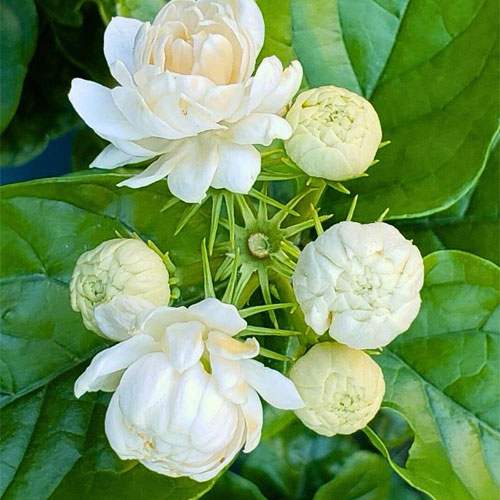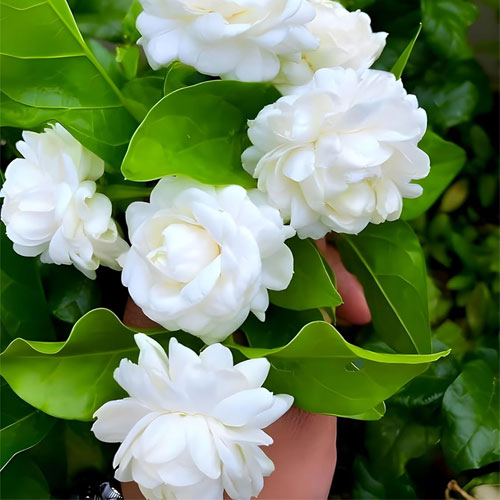Jasmine Kutti Mulla (Jasminum) is a beloved flowering ornamental plant admired for its small, pure white, star-shaped blooms and intense, sweet aroma. Perfect for home gardens, balconies, and borders, this live plant not only enhances aesthetics but also spreads its heavenly scent during early mornings and evenings. The plant blooms profusely, especially in warmer months, and requires very little maintenance. Whether you’re planting it in pots or directly in the ground, the Jasmine Kutti Mulla plant brings both fragrance and beauty to your outdoor or indoor space.
This variety is often used in garlands, hair adornments, and religious rituals due to its divine smell. Easy to grow in Indian climates, this live plant is ideal for first-time gardeners, floral lovers, and anyone wanting to add a touch of traditional floral charm to their garden.
Type of Plant: Live flowering plant (Jasminum sambac)
Plant Height on Delivery: 1.5 to 2 feet (including pot/polybag)
Sunlight Requirements: Full sunlight (4–6 hours daily)
Where to Grow: Terrace, balcony, home garden, borders
Growing Season: Year-round (best blooms in summer)
Soil Type: Well-drained, loamy or sandy soil
Ideal Climate: Tropical and subtropical
Fertilizer Requirement: Organic compost or NPK (once a month)
Life Span: Perennial plant
Blooming Time: Spring to late summer, and mild blooms in other seasons
Watering Frequency: Moderate (twice a week or when topsoil dries)
Maintenance Level: Low; prune after blooming for bushy growth
Ideal Pot/Bag Size: 9 to 12 inch grow bag or 10+ inch pot


What Size Grow Bag is Best For Jasmine Kutti Mulla Jasminum Flowering Live Plant?
Jasmine Kutti Mulla thrives best during the summer months, especially from March to July, with additional mild flowering throughout the year. In South Indian climates, it performs well year-round. Rainy season growth boosts leaf and stem development, while spring and early summer produce peak flowering.
Choose a medium to large pot with proper drainage. Fill it with loamy soil enriched with compost. Place the plant in a sunny spot. Water regularly but avoid overwatering. Trim the plant after each blooming cycle to promote more flowers.
Preparation: Select a 10–12 inch pot or ground spot with sun exposure.
Planting: Dig a small pit, remove the plant gently from the polybag, and plant without disturbing the roots.
Watering: Water immediately after planting. Continue watering twice a week.
Fertilization: Apply organic compost or balanced NPK once monthly.
Pruning: Cut dried twigs after flowering to maintain shape and health.
Pest Control: Occasionally check for aphids or whiteflies and treat with neem oil spray.
1. Apply Nutrient-Rich Fertilizers
When your plants begin flowering, use nutrient-rich fertilizers like Organic Bone Meal Powder or Vermicompost. This helps in boosting the bloom and enhances overall yield.
2. Use Organic Fertilizers
Feed your plants with organic fertilizers such as Cow Dung Manure or Neem Cake. Organic options promote healthy soil life.
3. Regular Feeding
Apply fertilizers every 20-25 days to ensure plants receive a steady supply of nutrients. Choose from various options like Cocopeat Compost for moisture retention.
Produces intensely fragrant white blooms
Ideal for temples, home rituals, hair decorations, and garlands
Highly ornamental with attractive glossy green leaves
Adapts well to both pots and ground planting
Attracts bees and butterflies, making your garden lively
Drought-tolerant once mature
Requires low maintenance, suitable for beginners
Adds a calming fragrance to the surroundings
Beautifies garden spaces with continuous blooming
Used in Ayurvedic and aromatherapy practices
Flowers are harvested for making garlands and perfumes
Enhances the visual appeal of any space
Avoid overwatering as roots can rot in soggy soil. Ensure the pot or ground has proper drainage. During winter or heavy rains, reduce watering. Always prune the plant after blooming seasons to keep it bushy and encourage fresh growth.
Yellow Leaves: Usually due to overwatering or poor drainage. Solution: Improve drainage and reduce watering.
No Flowers: Caused by too much shade or lack of nutrients. Solution: Move to a sunny spot and apply flower-boosting fertilizer.
Pests: Whiteflies or aphids may appear. Solution: Spray neem oil weekly for prevention and treatment.
Gundu Malli, Mogra, Mulla, Malle Puvvu, Mallige, Jaati, Mallikai, Juhi, Chameli, Banamalli, Sambac Jasmine, Jasmine Sambac, Mullai Poo, Mogra Flower Plant
Q1: Does Jasmine Kutti Mulla flower year-round?
Yes, it blooms heavily in summer but can flower mildly all year in warm climates.
Q2: Is this plant suitable for indoor growing?
Only if placed on a sunny balcony or window sill with at least 4 hours of sunlight.
Q3: How long does it take to flower after planting?
If healthy, flowering begins within 1–2 months during the season.
Q4: Can I use the flowers for religious purposes?
Yes, they are traditionally used in pujas and temple rituals.
Q5: Does it grow bushy or like a vine?
It grows as a small bushy shrub and stays compact with proper pruning.
Sign in now to receive a 5% instant discount on your first order when using code WELCOME. Begin your organic journey today!
By logging in, you're agreeing to our Terms of Service and Privacy Policy.
Meena Reddy
Bahut fragrant jasmine variety hai. Daily watering se fast growth ho rahi hai. Totally worth it.
Vivek Joshi
Plant thoda small aaya tha, par condition fresh thi. Thoda patience rakho, grow accha karega.
Archana Das
Affordable price aur premium quality. Flowers khilne ke baad bahut sundar lagte hain. 🌸
Rahul Iyer
Roots moist aur leaves bright green. Potted plant ka look elegant lag raha hai.
Priya Singh
Plant healthy tha aur blooming stage me tha. Fragrance amazing hai.
Suresh Reddy
Healthy aur fragrant plant. Balcony ke liye perfect size hai. Highly satisfied.
Ritika Jain
Jasmine lovers ke liye must buy! Packing clean thi aur plant ekdum alive tha. 🌿
Manoj Pillai
Plant ka growth fast hai, sunlight me rakhte hi naye shoots aaye. Khushbu bahut acchi hai.
Kavita Menon
Thoda late delivery hui par plant condition perfect thi. Flowers healthy aur fresh the.
Vikram Rao
Bahut accha plant mila. Garden me lagate hi blossom ho gaya. Golden Hills Farm reliable seller hai.